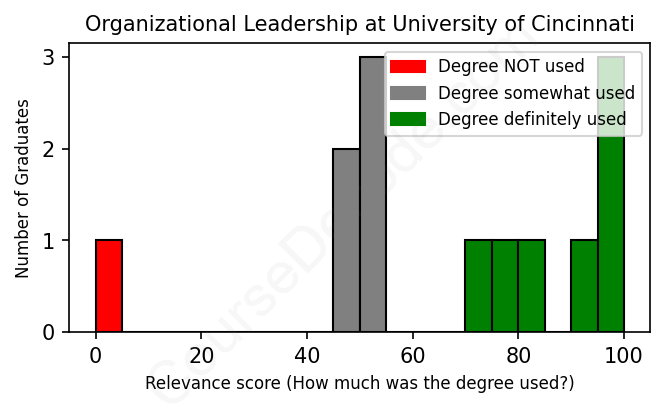
First, some facts. Of the Organizational Leadership graduates from University of Cincinnati we've analyzed , here's how many have used (or NOT used) their degree in their career:

These are estimates based on AI analysis of 13 LinkedIn profiles (see below).
The verdict? Slightly below average. Overall, with an average relevance score of 66%, Organizational Leadership graduates from University of Cincinnati have a slightly lower likelihood (-1%) of finding work in this field compared to the average graduate across all fields:
And for comparison, here's the chart for all profiles we've looked at across all degrees.
Also, after graduating, only 7% of these graduates have pursued further education other than another Bachelor's degree (such as a Masters degree or other), compared to the average across all profiles of 35%. This suggests a Bachelors degree is enough for most Organizational Leadership graduates, and it's normal to look for work straight after graduation.
See the details:
|
Relevance score: 92% We think this person has gone into a career highly relevant to their degree. We think this person has gone into a career highly relevant to their degree.
DEGREE INFOGraduated in 2021 from University of Cincinnati with a Bachelor's degree of Arts & Sciences in Organizational Leadership. No other secondary education since. JOB HISTORY SINCE GRADUATIONSite Integrated Planner/ Risk Analysis & Inventory Management Co-op Procter & Gamble Jan 2021 - Jul 2021 Human Resources Corporate Engineering Co-op  Procter & Gamble Jul 2021 - Dec 2021 Human Resources Representative  Schlumberger Mar 2022 - Present ABOUTReal leaders must be ready to sacrifice all for the freedom of their people. -Nelson MandelaEvery experience in my work history has taught me a valuable lesson on how to become a better leader, and with the experience I want to utilize my knowledge and experience for tailored solutions. I want to be a part of a team that helps me grow and succeed, I'd also like to be able to reciprocate that for my team. |
The top 10 most common jobs done by the graduates we've analyzed (ranked most common to least) are:
When looking at the job paths of those who graduated with a degree in Organizational Leadership from the University of Cincinnati, it's interesting to see that many have entered roles that either touch on organizational skills or are more tangentially related. Common jobs include positions like Human Resources Specialist, Project Manager, and various management roles that often involve team coordination and strategic planning. Those in HR or management roles usually leverage their leadership training to enhance team dynamics and improve organizational efficiency, which aligns well with their degree.
However, not all jobs clearly relate back to the core skills and principles of Organizational Leadership. Several professionals found themselves in roles such as administrative assistants, patient service representatives, or customer service positions—jobs that typically focus more on operational tasks than on the deeper leadership skills taught in their studies. While these roles can involve organization and some interpersonal skills, they often don’t require the specific leadership strategies or advanced management techniques emphasized in their degree program. Overall, while many graduates have managed to land roles that are relevant to their degree, a fair number have drifted into positions that don’t fully utilize their learning, suggesting a mixed bag in terms of alignment with Organizational Leadership principles.
Here is a visual representation of the most common words in job titles for Organizational Leadership graduates (this is across all Organizational Leadership graduates we've analyzed, not just those who went to University of Cincinnati):

Looking at the career paths of graduates from the University of Cincinnati with a degree in Organizational Leadership, it seems like there's a good mix of success and varying trajectories. Many of the early jobs for graduates tend to be entry-level positions or internships, such as administrative roles or office assistants. For instance, recent grads from 2010 to 2014 often landed jobs in supportive roles at local organizations or companies, which makes sense as they were just starting out and gaining practical experience in the workforce.
However, as we look five to ten years down the line, there's a noticeable trend of advancement into more strategic roles that align closely with their degree. Many graduates have transitioned into positions related to management, project coordination, and even development roles in organizations like Thermo Fisher Scientific, the American Heart Association, and Procter & Gamble. It's clear that those with this degree are finding relevant positions and building solid careers in the field. While there are certainly those who have taken less related jobs or remained in the early stages of their careers, overall, the trajectory looks promising for UC graduates in Organizational Leadership. That said, it’s important to remember that individual experiences will vary widely, so it’s a good idea for future students to focus on internships and networking opportunities during their studies to make the most of their degree!
Honestly, a Bachelor’s degree in Organizational Leadership is generally considered to be on the more manageable side compared to other fields like engineering or hardcore sciences. At schools like the University of Cincinnati, you’ll likely find a mix of group projects, presentations, and some theory on leadership and management. It involves a good amount of teamwork and communication, which can be fun if you enjoy working with others. Sure, there will be some challenging parts, especially when diving into theories or case studies, but overall, many students find it more about developing soft skills rather than heavy coursework. So, if you’re organized and enjoy interacting with people, you might find it to be a pretty doable path!
Most commonly, in the LinkedIn profiles we've looked at, it takes people 4 years to finish a Bachelor degree in Organizational Leadership.
Looking at the range of jobs these University of Cincinnati grads have held, it seems like some have been able to make decent money, while others might still be climbing the ladder. For instance, graduates from 2012 and 2014 have positions like Human Resources Specialist and Project Manager, which tend to pay better and show some career growth. In contrast, some earlier-career roles, like the Office Assistant positions, likely paid less. Overall, while it varies a lot depending on the individual paths—some seem to be doing well, others are still at the starting line with lower-paying jobs or internships. So, it’s a mixed bag, but there's potential for solid income in the longer run!
Here is a visual representation of the most common words seen in the "about" section of LinkedIn profiles who have a Bachelor degree in Organizational Leadership (this is across all Organizational Leadership graduates we've analyzed, not just those who went to University of Cincinnati). This may or may not be useful:

Here are all colleges offering a Bachelor degree in Organizational Leadership (ordered by the average relevance score of their Organizational Leadership graduates, best to worst) where we have analyzed at least 10 of their graduates:
| College | Score | Count |
|---|---|---|
 Texas A&M University-Commerce Texas A&M University-Commerce
|
74 | 16 |
 Arizona State University Arizona State University
|
72 | 23 |
 University of Louisville University of Louisville
|
69 | 10 |
 Purdue University Purdue University
|
67 | 12 |
 University of Charleston University of Charleston
|
67 | 17 |
 University of Cincinnati University of Cincinnati
|
66 | 13 |
 Trident University International Trident University International
|
65 | 10 |
 South Texas College South Texas College
|
65 | 11 |
 Southern Nazarene University Southern Nazarene University
|
63 | 15 |
 Ashford University Ashford University
|
58 | 20 |
 Azusa Pacific University Azusa Pacific University
|
58 | 11 |
 Northern Kentucky University Northern Kentucky University
|
57 | 25 |
 Wright State University Wright State University
|
52 | 24 |